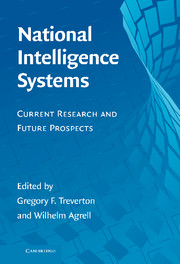Book contents
- Frontmatter
- Contents
- Preface
- 1 Introduction
- PART 1 DEFINING THE FIELD, ITS THEORY, HISTORIOGRAPHY, AND CHANGES AFTER THE COLD WAR
- 2 Building a Theory of Intelligence Systems
- 3 Reflections on Intelligence Historiography since 1939
- 4 A Theory of Intelligence and International Politics
- 5 Intelligence Analysis after the Cold War – New Paradigm or Old Anomalies?
- PART 2 RESEARCH ON NEW CHALLENGES, METHODS, AND THREATS
- PART 3 INTELLIGENCE, POLITICS, AND OVERSIGHT
- Index
- References
2 - Building a Theory of Intelligence Systems
from PART 1 - DEFINING THE FIELD, ITS THEORY, HISTORIOGRAPHY, AND CHANGES AFTER THE COLD WAR
Published online by Cambridge University Press: 05 June 2012
- Frontmatter
- Contents
- Preface
- 1 Introduction
- PART 1 DEFINING THE FIELD, ITS THEORY, HISTORIOGRAPHY, AND CHANGES AFTER THE COLD WAR
- 2 Building a Theory of Intelligence Systems
- 3 Reflections on Intelligence Historiography since 1939
- 4 A Theory of Intelligence and International Politics
- 5 Intelligence Analysis after the Cold War – New Paradigm or Old Anomalies?
- PART 2 RESEARCH ON NEW CHALLENGES, METHODS, AND THREATS
- PART 3 INTELLIGENCE, POLITICS, AND OVERSIGHT
- Index
- References
Summary
From a hobby of kings and a staple of lurid tales, intelligence has gradually become a proper topic of scholarship. During the last generation, various scholars have voiced impatience with the insightful but ad hoc pattern of studies in this new field and have called for research agendas oriented around cross-national comparisons. Such agendas, however, have not yet emerged. Various well-known factors help to explain this deficit of truly comparative analyses: the paucity of reliable, declassified data to analyze; the general lack of interest among government agencies in sponsoring such studies by in-house experts with access to the files; and the methodological divide between the academic historians (and their official counterparts) mining the available documents and their colleagues trained in political science who draw generalizations from the historical findings. Unfortunately, these perennial obstacles seem immune to quick or easy solutions. Another reason for the lack of comparative studies, however, is closer to home and perhaps easier to address: the lack of agreement, among both scholars and practitioners, of just what would be compared in a comparative approach to intelligence studies.
A great amount of writing, and some excellent research, has been done on intelligence activities and personalities. Not so much has been done on the collective authorities, resources, oversight, and missions assigned to parties officially assembled to perform intelligence duties of particular nations. Still less has been done to compare these collectivities across nations, cultures, or eras. What has been written is not comprehensive.
- Type
- Chapter
- Information
- National Intelligence SystemsCurrent Research and Future Prospects, pp. 11 - 37Publisher: Cambridge University PressPrint publication year: 2009
References
- 9
- Cited by



